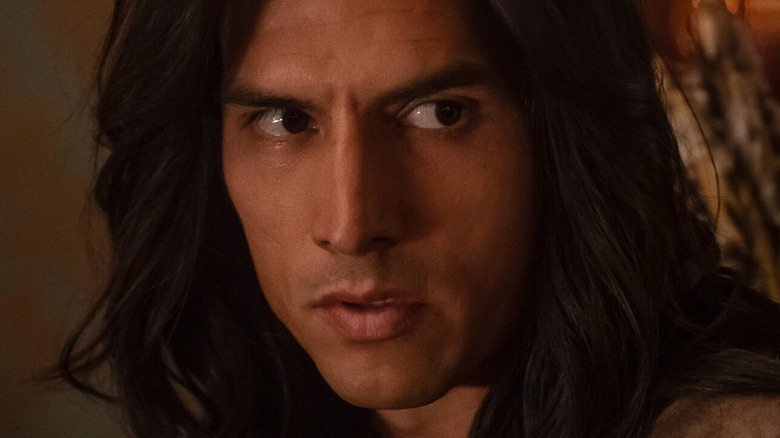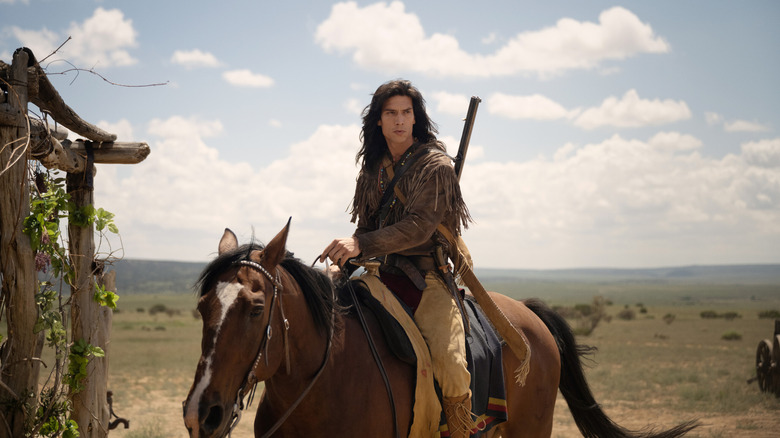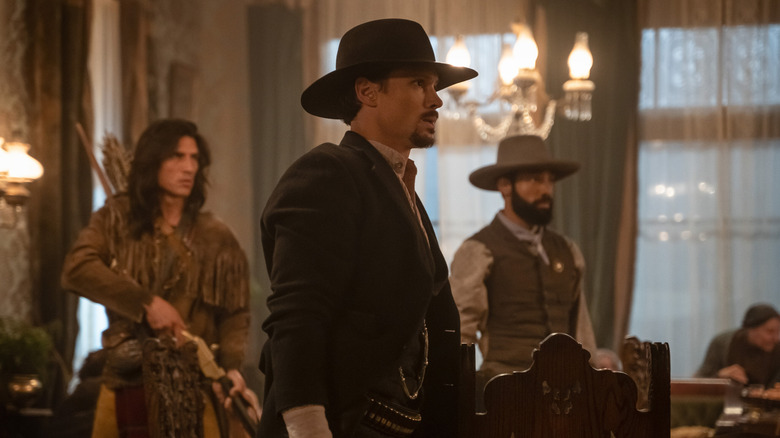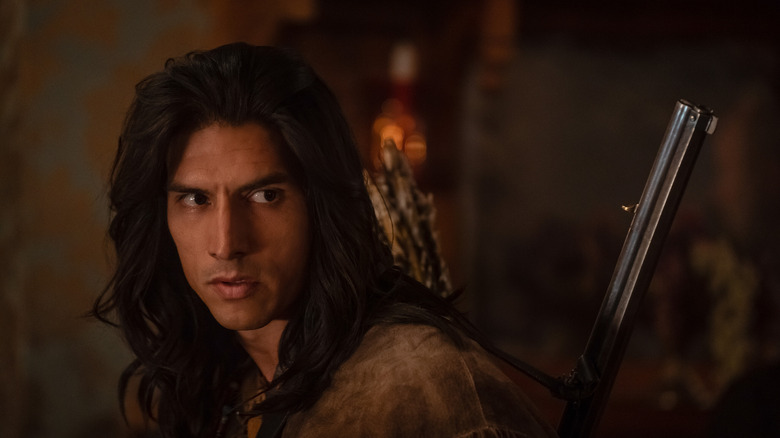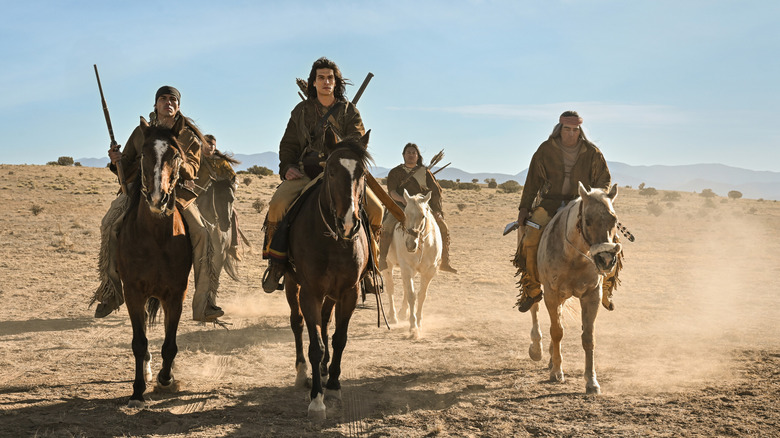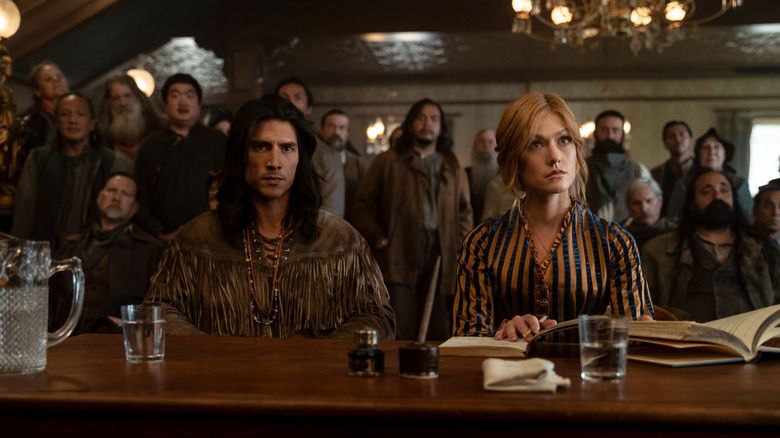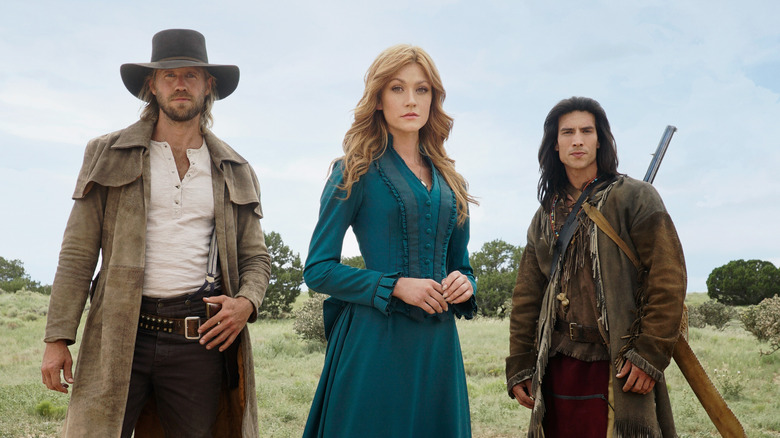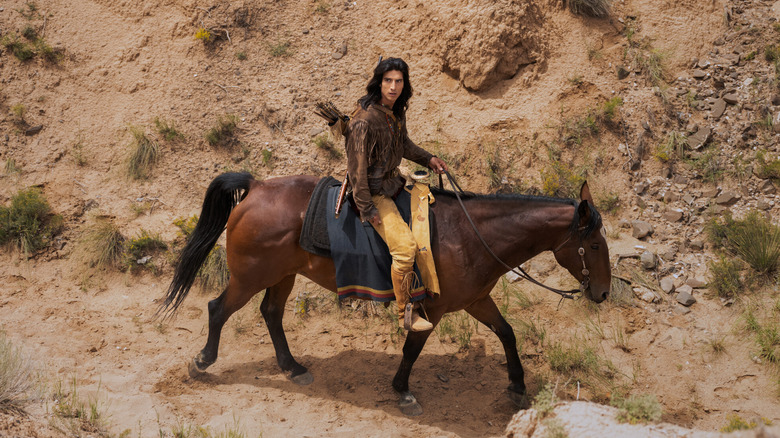Walker Independence's Justin Johnson Cortez Discusses The Midseason Finale's Native Storylines - Exclusive Interview
The following interview contains major spoilers for the "Walker Independence" midseason finale.
Some midseason finales go out with a bang, but the winter finale of "Walker Independence" went out with more than a few tears. The seventh episode of the series, titled "The Owl and the Arrow," centers on Justin Johnson Cortez's character, Calian, and his plight to prove his innocence after the town callously accuses him of the death of Francis Reyes.
While the show has undoubtedly touched on the whitewashing of American history and offers a much more realistic representation of what life would have actually looked like in the West, Episode 7 significantly drives this point home. The episode is much more impactful knowing that Calian's story is representative of millions of Native Americans who had their voices silenced in the 1800s.
Looper spoke to Justin Johnson Cortez during an exclusive interview where he discussed the hard-hitting episode, the cast, and how people can become better Native allies.
Reclaiming Native history
This is such a hard-hitting episode that explores the racism and hypocrisy of early settlers on Native land. Given that so many Westerns have painted the Native population as the villains, what does it personally mean to you to get to tell this more accurate version of history and to give a voice to these communities that had their own land stolen, only to then be treated as pariahs by the very people who stole it in the first place?
Wow. That's a hard-packing question. I love it. It's a lot of responsibility, realistically. It's what I wanted to do when we came into this, and when you're in the middle of it, you're like, "I hope we're doing it as well as we can — doing justice to the story."
The thing is, the Native story — when it comes to colonialism and the effects of that — is not just one thing. I was grateful that we're getting to touch on it a bit. There's so much more to tell when you get into the fact that people were fighting for land that they lived on for as long as they could remember — as long as their ancestors could remember. That alone is one thing you could tell for days and days and days.
Then you get into the complexity of mixing the cultures coming West with the way you interacted with that space before. I'm grateful for this episode because there's one thing that's still a part of the world we live in today: It's an epidemic of missing and murdered Indigenous women. In a way, we touch on that with Calian's sister and her getting taken when she was an 8-year-old girl. That's some way that you connect; things are still happening. The effects of colonialism go deep, and they're not gone. That's a hard pill to swallow, but I was grateful that we got to touch on that because it's powerful.
[It] also revealed a lot about Calian as a character, which, coming into this series, I was hoping we'd get to do. I was hoping we'd get to see a complex human being as opposed to what we've seen in the past in Westerns — which is a one-dimensional, stoic Indian. It's a great start, and I don't think that conversation should ever end. I don't think these issues should ever be like, "Well, we did that. We can move on now," because they're always going to be a part of it. But I was surprised that we were able to dive in, and I was very grateful for that.
Adding impactful storylines
Have you worked with the writers on any of these plot points or tweaked any of the storylines? Is there a particular moment in history or an issue that you want the show to cover moving forward?
As things come out with each episode, you go through it, and you see it could be as simple as a word that doesn't quite fit right in your mouth or doesn't quite fit for Calian, and [you're] like, "This is a very Westernized word that he probably wouldn't use." Further than that, I'm always trying to push for as much truth and honesty as I can with this character.
He may not have the most time on screen, which is not what it's about for me. It's about — when you are on screen — telling the most truthful story you can. I'll talk to the showrunner about it, and they've been amazing. If I come [up] with some thoughts or ideas or alterations to what they put on, they're very receptive. Sometimes, it's a back-and-forth of, "This is where my head was at when I wrote this" [and] "Well, this is how I'm interpreting it." It's been a great collaboration and process.
In terms of Nascha, that storyline didn't exist, and the 8-year-old girl that Calian encounters in Episode 3 was actually going to be a one-off, a funny little instance where Calian is being elusive and no one could see him except some little girl who spots him. I actually pitched to the showrunner, "Hey, what if she's more than that? What if this is a vision that Calian is having for one reason or another, whether it be someone from his past or his family?" He thought on it for a few days, and then he let me know about two days before we were shooting, "We're going to run with that storyline."
I was grateful because the storyline opened up a lot and revealed a lot about Calian — why he is the way he is when we meet him in the pilot, the man he's become and why he does what he does, why he tracks, and ultimately, why he found Abby. It wrapped that up so beautifully and heartbreaking[ly], but they did a really good job.
As far as moving forward, the reservation system in history is a complex one, especially when it comes to the Apache people. You had a number of tribes that would move into reservations, and you had a number of Apache groups of people who resisted that for a very, very long time. It's a hard story. It's not so clear-cut. It's a hard thing to intertwine in a 42-minute episode, especially when you might have to leave the main group to tell that story. It's something I want to get into, but it's tricky, and it's difficult, so we're trying to figure out how to stay true to this character as best we can.
Calling out hypocrisy
Calian has a number of incredibly impactful statements and speeches from this episode alone. Which ones have impacted you or resonated with you the most, and why do you think it was so important for Calian to stand his ground and call out the hypocrisy of those condemning him?
When he stands up and basically reveals that, "Hey, I've been here, I've been helping you guys, and you guys haven't done that for me — you haven't even seen me as a human. You've written me off before I even got a chance to speak." That pain is behind that realization. He's always trying to give people the benefit of the doubt. It's been a huge rift between him and his own people, his own tribe. He's been defending them in a way that no one else understands why, and then it all gets thrown back in his face in this moment, and he realizes, "No, they still don't see me. Even [after] everything I've done, they still don't see me as equal to them." That's so heartbreaking, and that's powerful.
It was a great moment for people to maybe step outside themselves and their own experience and say, "I could relate to this in a way. Maybe I'm not seeing this relationship I have the way I should be seeing it." That's ultimately what it's about when it comes to making TV or film: You want to be able to hold up a mirror, and you want people to be able to relate one way or another, but these are hard lessons to learn and hard things to stomach at times. I was glad that they decided to lean into the heaviness and the heartbreak of this story.
The trauma of capital punishment
This was the first time we've seen anything like an attempted hanging as punishment in the show. What was that scene like to film? Did you do any research on this form of capital punishment, and what was the mood on set during this very intense scene?
It was definitely up for conversation whether the noose should go around his neck or not. I didn't do any research on it specifically, but personally, I wanted it to go around Calian's neck, to show how brutal the time could have been. It's not something that [we've seen before], and it really adds to it. I feel like we would've missed an opportunity if we didn't do that, so I was happy that we ended up doing it. It's one of those things where it's like, "We're not quite sure how it's going to sit in our stomach[s] when we see it," so we did actually do it both ways. We did one without it and one with it on.
I was pleased that they went with a more powerful statement, in my opinion, but it is hard to watch. On the day, Kat [McNamara's] tears and Katie [Findlay's] tears I think were real, because they're seeing their real friend up there. It's a very intense visual. It was heavy, and it wasn't exactly light, but I always try to keep it light on set, personally. They yell "cut," and I have respect for other actors in their workspace, but I like to remember, "This is our real life, this is the life we're portraying here, and I like to keep it light for that." People were giving me more respect than maybe I was giving myself on that day.
Also, my daughter played Nascha, and she was in that scene, and people were very delicate and respectful when it came to her seeing that. We had a whole conversation about it. We asked her about it — she's grown up with me being an actor, and she does grasp the fact that we're making make-believe. She's like, "It's fine. I know you're safe."
But that hit for people to see that, and it definitely hit me when I was up there and looking down on her. I was like, "Oh, this is really sad." Not that I didn't realize that reading the script — I cried, so I got it. But it's a different thing when you're there.
Calian's family history
We got a deeper look into Calian's family history [during] this episode and [the] last episode. We haven't seen too much of the Apache tribe [so far], so what are some of the things that you're hoping to develop down the line in that family department and also in the tribe as a larger whole?
That's always been a challenge since day one when I was talking to a showrunner about this character. It's called "Walker Independence," and the show is about the town and the people in the town. It was always like, "How do we get Calian into town?" I didn't even expect to get as much of the tribe and the camp as we have ... We haven't seen a lot, but as a Native actor, [and with] the way things have gone in the past, there was a part of me that accepted that we probably won't get too deep into it.
I wanted to try to bring as much as I [could], but I was pleasantly surprised when they were like, "We're going to have this scene in here. We want to show this." We do get more of it as the season goes on, so even after this one, we will see a bit more of the camp. But it's going to be an ongoing challenge [of] how [we can] intertwine these two worlds because it's something that's very unique to Calian. We don't have Hoyt and Abby and everyone coming to hang out at the camp, so it has to make sense. It will be challenging, but I'm confident that we'll find the right balance.
Boxing with Kat McNamara
Calian and Abby have such a wonderful dynamic. What has it been like working with Kat McNamara, and do you have any fun stories with her from set?
This is so funny because we're constantly laughing on set all the time, but when people are like, "Do you have a great story?" I'm like, "I don't know if I have a specific story." She's so lovely. She's so great to work with. She's such a professional. Coming into this, I remember being nervous to meet her because you never know how people are going to be when you meet them. She's honestly one of the kindest people I've ever met.
The dynamic with us makes sense. Since I met her, I [have felt] protective over her in a way. Not that I need to be, because she's fully capable as a person — I've boxed with her, we hit mitts and stuff, and she [can] throw a punch. But I've always felt protective over her in a way.
We feel safe together, and that's really nice when you get to work with someone and that part of it comes easy and the chemistry's there. But I'm confident that anybody could have that chemistry with her. I'm trying to think of any funny stories — I don't know, probably something to do with a horse and riding. We're constantly laughing, all of us, on set, and it's probably because I'm being a goofball or somebody else is doing something silly. It's been lovely. We're going to miss it while we take a break after Season 1, for sure.
Hoyt and Calian: Reluctant besties?
Hoyt and Calian are almost like reluctant besties. They don't necessarily see eye to eye on things, but Hoyt goes to bat for Calian in this episode. What have some of your favorite moments been working with Matt Barr, and how do you think Calian and Hoyt's dynamic will evolve from here?
The Calian-Hoyt dynamic is one of my favorite things about this show. Matt — I love that man to death. I truly do. I had lunch with him today, and we hang out, and he loves my family, and they love him.
He's so funny. It comes easy to him ... He makes me laugh all the time. I watched the episodes back after filming with him [and] I was still laughing. It's great. We get each other — we're cut from the same cloth in a way. We love all the physicality. We love that stuff and riding the horses, and we're like kids out here. We're like 6-year-olds playing make-believe, and it's a dream come true.
There's actually a funny story with Matt [from] Episode 3. We ride double on the horse, so we did the practice of him swinging up, which looks way easy, but it's actually quite difficult. Everyone's like, "That looks easy." I'm like, "Man, it's hard. We worked really hard for that." We had to practice riding double, so we're out at the ranch or we're riding around — and [I] probably shouldn't say this because they'll freak out — but I get him on the back, and we're riding, and we're at a low and we take a right-hand turn, and I feel him sliding. He's sliding off my side, and I'm like, "Oh, no, he's going to go."
He knew. Afterward, he's like, "Dude, I thought I was going to hit the ground." But he starts sliding, and I reached around and grabbed him and pulled him back on. Everyone else in the cast is on their horses watching us, and I think everyone's heart stopped for a second, because I was like, "I can't be the one responsible for Matt Barr breaking his arm right now. This is going to be awful." I got him back on, and we stopped the horse, and we were able to laugh. But for a second, I thought for sure I was fired. I was like, "I'm done."
How mad is Matt going to be at you for sharing that story?
No, he shared it once. That's why I felt okay telling it. Being on the back of a horse is actually terrifying. I'm glad I was in control. I was lucky to be the one in front. But he's down for anything. He was like, "Sure, I'll jump on." He gets on. He's a cowboy in real life.
How to be a Native ally
Have you had the chance to work with EP Jared Padalecki yet? If so, what was that experience like?
Not acting-wise — but yeah, he's so down to earth, and he's a solid dude. I don't know if I was not expecting that or what it was, but when I met him, I was like, "Dude, I get you. You get me. This is cool." It'd be fun to play with him one day, though. It would be great to work together. Hopefully, we can make that happen on their show. That'd be awesome.
Fingers crossed for that.
Fingers crossed. People love that.
I love that the horse is named Cordell.
Cordell. It's so good.
We still have a long way to go in getting justice and equal rights for Native populations in the U.S. How do you think shows like "Walker Independence" help spread awareness about these issues, and what can fans of the show do to help support the movement in real life?
That's a good question. [It's] the fact that they're trying their best to be realistic and true. It may seem like a little story, even just a little part of this one season of the show, but it's trying to be as true as you can in every little moment that you get. The fact that Nascha was taken as a kid — that's a powerful thing that people might think of as, "That's a TV thing." But that was real. Hopefully, people will connect those dots and see, "Oh, this actually happened. Cultures were getting erased."
In terms of how to help and be allies, it's difficult. There [are] definitely organizations out there that are raising funds for different tribal foundations and stuff like that that you could donate to.
In the industry, hopefully, we get more Native voices that are behind the camera writing and directing and getting to tell these stories. When you get these kids growing up, and they're able to see themselves represented on the screen, that goes a long way. I hope that networks and different productions give these storytellers a voice and that they get the necessary resources that do it well, so people will watch. They'll be able to be on the screen, and kids will be able to see themselves and believe that they could be something one day and that, "Hey, that's me up there, I could do that. They remind me of me." That goes a long way.
"Walker Independence" returns January 5 on The CW.
This interview has been edited for clarity.
